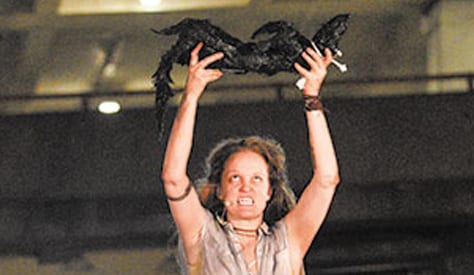DTC’s outdoor vision of ‘Electra’
The first thing you hear in Dallas Theater Center’s new adaptation of Electra is breath panting in your ear. It comes as a shock — so intimate, so real. The DTC has supplied every patron with headphones, which brings every word conspiratorially into your brain. It’s a practical device — the play, set outdoors, walks its audience in and around the noisy public space of Annette Strauss Square — but also a canny artistic choice by director Kevin Moriarty. He wants the audience to feel as caught up in the intrigue as the characters themselves.
This is grand tragedy as only the Greeks, and perhaps Shonda Rhimes, have the balls to pull off. Electra (Abbey Siegworth) is the original girl with daddy issues. Psychologically, she’s the mirror image of Oedipus — a woman sexually obsessed with her own father, Agamemnon, who was murdered by his wife Clytemnestra (Sally Nystuen Vahle) and her new husband Aegisthus (Tyrees Allen) as revenge for Agamemnon sacrificing their eldest daughter Iphigenia a decade earlier, as an offering to the gods to win the Trojan War. Now Electra, and her long-absent brother Orestes (Yusef D. Seevers) are plotting to continue the cycle — “Blood for blood!” is shouted.
Yeah, that kinda policy always ends well. Ask Hamlet. (The parallels to Shakespeare are stark.)
As familiar as the plot is, and as comparatively clunky as the structure and dialogue are, full of overwrought emotions and purple prose, the decision to present this play in the open air, moving us to new settings instead of bringing sets in, gives Electra an amazing immediacy. With the language piped into our ears, along with pulsing sounds and mood-setting music, it’s more akin to living inside a graphic novel, or an especially well-designed but dark attraction at a Disney theme park, than a traditional play. It’s feels more like Julie Taymor’s movie of Titus Andronicus than a Shakespeare-in-the-park production.
As wordy and dense as Greek tragedy is, though — there’s a lot of narration — it manages to hit home in part because the emotions ring true across the millennia. As Electra’s sister, Chrysothemis (Tiana Kaye Johnson), counsels her not to rock the boat and antagonize the new king, she spews back, “He is not my king!” That’s something a lot of people in 2017 can relate to.
— Arnold Wayne Jones
This article appeared in the Dallas Voice print edition April 14, 2017.


